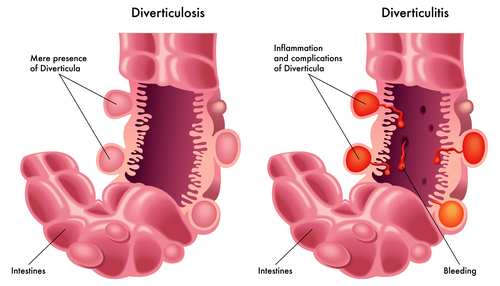Diverticulitis
 The colon can have small pouches in the lining of the colon or large intestine that bulge outward through weak spots. Each pouch is called a diverticulum. Multiple pouches are called diverticula. The condition of having diverticula is called diverticulosis.
The colon can have small pouches in the lining of the colon or large intestine that bulge outward through weak spots. Each pouch is called a diverticulum. Multiple pouches are called diverticula. The condition of having diverticula is called diverticulosis.
It is most common in the lower portion of the large intestine. About 10 percent of Americans older than 40 have diverticulosis. The condition becomes more common as people age. About half of all people older than 60 have diverticulosis.
When these pouches become infected or inflamed, it is called diverticulitis.
It is an acquired disease. This is common in countries where highly refined low-fiber diets are common. The disease is rare in countries of Asia and Africa, where people eat high-fiber and vegetable diets.
Symptoms:
Diverticulosis usually causes no symptoms. Most people won’t know they have this unless it shows up in an examination or it develops into diverticulitis. The symptoms of diverticulitis are
Abdominal cramping (usually more severe in the lower left side)
Abdominal pain triggered by touch
Gas, belching, bloating
Diarrhea, constipation, or very thin stools
Blood in the stools
General feeling of being tired or run-down
Treatment:
Diverticulosis:
Eat food high in fiber – especially fruits and vegetables. Increase your fiber intake slowly over six to eight weeks. Your digestive system will need time to adjust. You can expect bloating and gas in the first few weeks.
Drink plenty of liquids, including fruit and vegetable juices and water.
Exercise regularly.
Diverticulitis
Uncomplicated diverticulitis with mild symptoms usually requires the person to rest, take oral antibiotics, and be on a liquid diet for a period of time. Medical doctors will advise a hospital stay, intravenous antibiotics, and surgery.
Natural Treatment: Prevention
- Eat fiber-rich foods such as fresh fruit, vegetables, and whole-grain breads and cereals to relieve constipation
- Drink at eight glasses of water daily to cleanse the body and keep the digestive system moving
- Exercise regularly because the more active you become, the less likely you are to develop diverticulitis
- Avoid delaying bowel movements;s rather, respond quickly to avoid increased pressure in the colon
- Reduce your intake of red meat and instead substitute it with chicken or fish
- Add a fiber supplement, such as psyllium seed bulking agents, to your diet
- Avoid foods containing small seeds, such as tomatoes and popcorn, as well as using whole-seed spices such as cumin and sesame seeds may lodge in diverticula and cause inflammation
- Cleanse your colon to help prevent toxic buildup by using colonic irrigation or herbal cleanses
- Avoid using laxatives, enemas, and narcotic medications that can cause constipation
- Learn to enjoy meals more by sitting down to eat, eating more slowly, and paying attention to your food
Promote Healthy Digestion:
Build a Healthy Digestion with Dr. Berg’s Formulas.
They are excellent products that we recommend.
Dr. Berg’s Digestive Kit
Advanced Digestive Formula
A new formula with ginger, peppermint, anise, and fennel to further support healthy digestion and potentially reduce indigestion, gas and bloating. Betaine hydrochloride and apple cider vinegar in this supplement are natural acidifiers that support normal stomach function. Take Dr. Berg’s Advanced Digestive Formula before or after a meal to help your body digest a healthy diet and more effortlessly extract the nutrients it needs.
Gallbladder Formula
Gallbladder Formula contains natural ingredients to provide bile salts for bloating and digestive stress.
This product has a blend of gallbladder-targeted nutrients to thin bile, reduce digestive stress, and improve the digestion of fats. Most digestive drugs work by reducing acid, and this natural product enhances the bile, a commonly omitted factor.
Support a Healthy Digestive System
Read more: Dr. Berg’s Digestive Kit
*Probiotics in Inflammatory Bowel Disease
Probiotics for Gastrointestinal Conditions: A Summary of the Evidence.
Sign up to receive the MCVitamins Newsletter!
Up-to-date info on the latest health-related news happening in the world
(available in English only)

